The Merriam Webster Collegiate Dictionary defines anti-hero as “a protagonist or notable figure who is conspicuously lacking in heroic qualities.” You know that character you are suppose to be repelled by and/or horrified at their actions, but you can’t help but smile a little at their evilness or their misdeeds. The kind of person you love to read about (often because they are sticking it to the “man”) but you would not necessarily want to have them as a friend. One example most people might identify with is Capt. Jack Sparrow of the Pirate of the Caribbean fame. He is a great character but I would not want him in my house!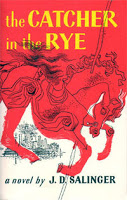 One of the first anti-heroes I read about was Holden Caulfield in Catcher in the Rye (M) by J.D. Salinger. He is probably “the rebel without a cause” that a lot of people are familiar with, even if you have never read the book.
One of the first anti-heroes I read about was Holden Caulfield in Catcher in the Rye (M) by J.D. Salinger. He is probably “the rebel without a cause” that a lot of people are familiar with, even if you have never read the book.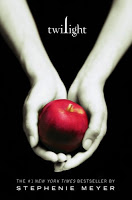 I find that teens really enjoy reading novels with an anti-hero theme. This maybe is why the Twilight series (M) is so very popular. I did not enjoy these novels; they focused more on the love triangle of Bella, Edward and Jacob. Maybe I would have enjoyed it more if Vampire Edward fell in love with the Werewolf Jacob? !
I find that teens really enjoy reading novels with an anti-hero theme. This maybe is why the Twilight series (M) is so very popular. I did not enjoy these novels; they focused more on the love triangle of Bella, Edward and Jacob. Maybe I would have enjoyed it more if Vampire Edward fell in love with the Werewolf Jacob? !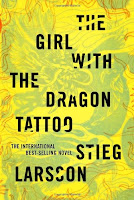 Lisbeth Salander of the Millennium Series (M) (or as many people would identify it: the series with “The Girl with the Dragon Tattoo) is a great example of an anti-social hero. She is a computer hacker who survived a traumatic childhood. She is very introverted, anti-social and has difficulties with people in general, but especially men. She deals with life by presenting an unappealing front, “a pale skinny young woman who has hair as short as a fuse, and a pierced nose and eyebrows…..a wasp tattoo…on her neck…tattooed loops around…her arms …a dragon tattoo can be seen on her left shoulder blade”. Her computer hacking skills enable her to help Mikael Blomkvist in researching his journal articles and solving various crimes through out the series.
Lisbeth Salander of the Millennium Series (M) (or as many people would identify it: the series with “The Girl with the Dragon Tattoo) is a great example of an anti-social hero. She is a computer hacker who survived a traumatic childhood. She is very introverted, anti-social and has difficulties with people in general, but especially men. She deals with life by presenting an unappealing front, “a pale skinny young woman who has hair as short as a fuse, and a pierced nose and eyebrows…..a wasp tattoo…on her neck…tattooed loops around…her arms …a dragon tattoo can be seen on her left shoulder blade”. Her computer hacking skills enable her to help Mikael Blomkvist in researching his journal articles and solving various crimes through out the series.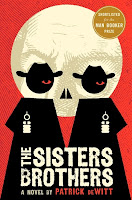 What can I say about a book that has won the 2011 Governor General’s Literature Award, the 2011 Rogers Writers Trust Fiction Prize Winner, the 2011 Scotiabank Giller Prize Finalist, the 2011 Man Booker Prize Finalist and the #1 Amazon Best Book of 2011 National Bestseller. The National Post has stated “Fresh, hilariously, anti-heroic, often genuinely chilling, and relentlessly compelling.” All this for a western novel entitled The Sisters Brothers (M) by Patrick deWitt. Normally I do not like to read westerns but the cover of this novel attracted me. Eli and Charlie Sisters are guns for hire in the 1850’s Old West. Like most brothers, there are differences of opinion on how to do things, including killing their next target. These brothers are bound together by blood, violence and love.
What can I say about a book that has won the 2011 Governor General’s Literature Award, the 2011 Rogers Writers Trust Fiction Prize Winner, the 2011 Scotiabank Giller Prize Finalist, the 2011 Man Booker Prize Finalist and the #1 Amazon Best Book of 2011 National Bestseller. The National Post has stated “Fresh, hilariously, anti-heroic, often genuinely chilling, and relentlessly compelling.” All this for a western novel entitled The Sisters Brothers (M) by Patrick deWitt. Normally I do not like to read westerns but the cover of this novel attracted me. Eli and Charlie Sisters are guns for hire in the 1850’s Old West. Like most brothers, there are differences of opinion on how to do things, including killing their next target. These brothers are bound together by blood, violence and love.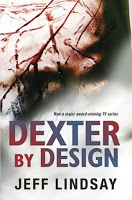 What can I say about the Dexter series (M) . I fell in love with the character Dexter Morgan long before he appeared on television screens across North America. Jeff Lindsay created a serial killer who helps the city of Miami by killing other serial killers. Even the play on word with the titles amuses me, such as Dearly Devoted Dexter, or Darkly Dreaming Dexter. At first the TV Dexter really bothered me. His “voice” wasn’t the same as the novel. I got quiet chuckles from the print version of Dexter with his Dark Passenger whereas the TV Dexter, not so much. Mind you he did grow on me, but I do prefer the novels.
What can I say about the Dexter series (M) . I fell in love with the character Dexter Morgan long before he appeared on television screens across North America. Jeff Lindsay created a serial killer who helps the city of Miami by killing other serial killers. Even the play on word with the titles amuses me, such as Dearly Devoted Dexter, or Darkly Dreaming Dexter. At first the TV Dexter really bothered me. His “voice” wasn’t the same as the novel. I got quiet chuckles from the print version of Dexter with his Dark Passenger whereas the TV Dexter, not so much. Mind you he did grow on me, but I do prefer the novels.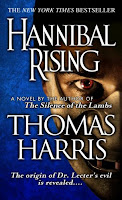 Once again a character that I love but no way would I like to meet. Dr. Hannibal Lecter was first introduced to the world in Thomas Harris’ 1981 thriller novel Red Dragon (M) as a brilliant psychiatrist and cannibalistic serial killer. He becomes a main character in the Silence of the Lambs (M), Hannibal (M) , and Hannibal Rising (M). It is his wicked and twisted intelligence that appeals to me. When first introduced, he is assisting the FBI in helping to catch other serial killers. Little do they know that Lecter is playing them to his own purposes. The more Lecter became the main character of the books, the more the reader cheers for his success.
Once again a character that I love but no way would I like to meet. Dr. Hannibal Lecter was first introduced to the world in Thomas Harris’ 1981 thriller novel Red Dragon (M) as a brilliant psychiatrist and cannibalistic serial killer. He becomes a main character in the Silence of the Lambs (M), Hannibal (M) , and Hannibal Rising (M). It is his wicked and twisted intelligence that appeals to me. When first introduced, he is assisting the FBI in helping to catch other serial killers. Little do they know that Lecter is playing them to his own purposes. The more Lecter became the main character of the books, the more the reader cheers for his success.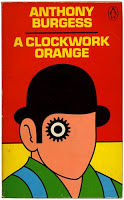 Alex in A Clockwork Orange (M) by Anthony Burgess is a “bad boy” . The American Film Institute rated Alex as the 12th greatest film villain of all time. Alex is a 15 year old sociopath who robs, rapes and murders for his own amusement. He is the youngest of a gang of four juvenile delinquents, but he is the most fearless and intelligent of the bunch. He is sent to jail for his crimes and treated by an aversion therapy, in which he is injected with a drug that will make him violently ill at the sight or thought of hurting anyone. While researching for this blog, I found out that the early American and British versions have different endings. In the US version, Alex returns to his ultra violent self before his brain buckles due to the neural surgery. In the British edition, Alex is 18 and working at the National Record Library and is “civilized”. I am not sure which ending I like. Probably the one that Alex is still bad.
Alex in A Clockwork Orange (M) by Anthony Burgess is a “bad boy” . The American Film Institute rated Alex as the 12th greatest film villain of all time. Alex is a 15 year old sociopath who robs, rapes and murders for his own amusement. He is the youngest of a gang of four juvenile delinquents, but he is the most fearless and intelligent of the bunch. He is sent to jail for his crimes and treated by an aversion therapy, in which he is injected with a drug that will make him violently ill at the sight or thought of hurting anyone. While researching for this blog, I found out that the early American and British versions have different endings. In the US version, Alex returns to his ultra violent self before his brain buckles due to the neural surgery. In the British edition, Alex is 18 and working at the National Record Library and is “civilized”. I am not sure which ending I like. Probably the one that Alex is still bad.
My list of anti-heroes could go on and on: Anne Rice’s Lestat (M), Serverus Snape from Harry Potter (M), Randle McMurphy in One Flew Over the Cuckoo’s Nest (M) , Patrick Bateman in American Psycho (M), Humbert Humphreys in Lolita (M), etc. Who would you add to this list?

